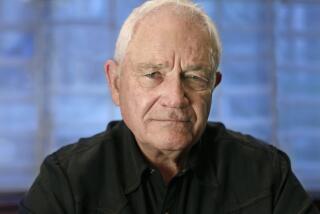David Brown dies at 93; producer of ‘Jaws,’ ‘The Sting’
David Brown, the former 20th Century Fox executive who partnered with Richard Zanuck in the early 1970s and produced the blockbuster hit “Jaws,” as well as “The Verdict” and “Cocoon” before launching a solo career as a film and theatrical producer, has died. He was 93.
Brown, the husband of former Cosmopolitan editor Helen Gurley Brown, died Monday at his home in New York City after a long illness, said Donna Lagani, senior vice president and publishing director of Cosmopolitan.
As half of the Zanuck-Brown film producing team in the 1970s and ‘80s, Brown’s other credits include films such as “The Sugarland Express” ( Steven Spielberg’s first theatrical feature), “The Girl from Petrovka,” “The Island” and “Neighbors.”
Zanuck and Brown also were executive producers of “The Eiger Sanction,” “MacArthur” and “The Sting,” the 1973 film that won the best picture Oscar for producers Tony Bill and Michael and Julia Phillips.
Shortly before amicably splitting with Zanuck in 1988, Brown reportedly acquired the film rights to “Driving Miss Daisy” for the partnership, and he was executive producer on the 1989 film, which won the best picture Oscar for producers Zanuck and Lili Fini Zanuck.
Among Brown’s later film credits as a producer are “The Player,” “A Few Good Men,” “Angela’s Ashes,” “Deep Impact” and “Chocolat.”
In 1991, Brown and Zanuck jointly received the Irving G. Thalberg Memorial Award from the Academy of Motion Picture Arts and Sciences. The award, which is voted on by the academy’s board of governors, is presented to “creative producers whose body of work reflects a consistently high quality of motion picture production.”
Two years later, they received the David O. Selznick Lifetime Achievement Award from the Producers Guild of America.
Brown’s reaction to the lifetime achievement award, he told Daily Variety, “is one of total joy and gratitude for being able to spend a lifetime in the film world” -- not that he was “suggesting the lifetime has been spent. I’m busier now than when I was 30, so I take this as a mid-lifetime achievement award.”
He was 76 at the time and still working.
A onetime journalist, Brown was managing editor of the old Cosmopolitan magazine in New York City in late 1951 when he was offered the job as head of the story department at 20th Century Fox, then presided over by studio chief Darryl F. Zanuck, Richard Zanuck’s father.
Over the years, Brown earned a reputation in Hollywood for being what Spielberg has called “as classy a gentleman as has ever graced the behind-the-scenes.”
Director Ron Howard told Variety in 1998 that, as a producer, Brown was “less the wheeler-dealer than the great judge of content. He knows that story drives everything. He loves writing, and he know what ideas will translate and what won’t.”
In an interview with Variety the same year, Brown explained that “I come by my interest in the written word almost genetically. I was reading the New York Times at age 5.”
Born in New York City on July 28, 1916, Brown graduated from Stanford University in 1936 and from Columbia University’s school of journalism in 1937.
That summer, he became the second-string drama critic and night editor for Women’s Wear Daily.
He later teamed with future screenwriter Ernest Lehman writing freelance magazine articles, horoscopes for subway scales and vending machines, and ghost-writing radio comedy material for Eddie Cantor.
He also worked as nonfiction editor for Liberty magazine before he was drafted into the Army in 1943.
After serving as a first lieutenant in the psychological warfare section of military intelligence during World War II, he returned to Liberty, where he became fiction editor. The job “taught me how to evaluate fiction -- a skill that later got me a job in Hollywood,” he wrote in his 1990 memoir “Let Me Entertain You.”
At Liberty, he quickly moved up to executive editor and then editor-in-chief. Then came his pre-20th Century Fox job as managing editor of Cosmopolitan.
After losing his job at the by-then financially troubled 20th Century Fox in the early ‘60s, Brown moved back to New York, where he became executive vice president of New American Library’s hardcover book division.
In 1959, the twice-married Brown wed Helen Gurley, a copywriter in a Los Angeles advertising agency.
Inspired by an idea that her husband had for a book, Helen Gurley Brown wrote the 1962 bestseller “Sex and the Single Girl.” After writing a sequel, “Sex and the Office,” and launching a syndicated newspaper column, she was besieged with mail from readers asking her advice on personal matters.
In 1964, David Brown got the idea of creating a magazine for the women who had been writing all those letters to Helen -- women who were, as he put it, “addicted to Helen’s frank, feminist views.”
Together, the Browns created the format for what became the spicy new Cosmopolitan magazine, aimed at young women and launched in 1965 with Helen Gurley Brown as editor.
From the start, David Brown edited Helen’s personal column in the magazine, “Step Into My Parlor,” and wrote, for free, the provocative cover blurbs, such as “How to Turn Him On While You Take It Off.”
In 1964, Brown returned to 20th Century Fox as vice president in charge of story operations and a member of the board of directors. He worked closely with Richard Zanuck, who had been appointed by his father as executive vice president in charge of production in 1962 and later became the company’s president.
“The Sound of Music,” the 1965 musical starring Julie Andrews, was a box-office smash, and the studio had other hits with movies such as “ Butch Cassidy and the Sundance Kid,” “MASH” and “Patton.”
But the studio also lost money on a number of films, including the big-budget musicals “Doctor Doolittle,” “Star!” and “Hello, Dolly!”
“We brought the company from nothing to a cash flow that has never been equaled,” Brown told The Times in 1973. “Then it was 1929 all over again.”
In late December 1970, the board of directors forced Richard Zanuck and Brown to resign -- a power play reportedly engineered by Zanuck’s father.
After 18 months as executives at Warner Bros., Zanuck and Brown formed their own company.
“Had we not left Fox involuntarily,” Brown told Forbes magazine in 1981, “we would never have chosen to become entrepreneurs.”
Brown’s credits as a Broadway producer include the musicals “Dirty Rotten Scoundrels” and “Sweet Smell of Success,” the comedy “The Cemetery Club,” the drama “A Few Good Men” and the solo show “Tru.”
He is survived by his wife.
dennis.mclellan @latimes.com
More to Read
Start your day right
Sign up for Essential California for the L.A. Times biggest news, features and recommendations in your inbox six days a week.
You may occasionally receive promotional content from the Los Angeles Times.






